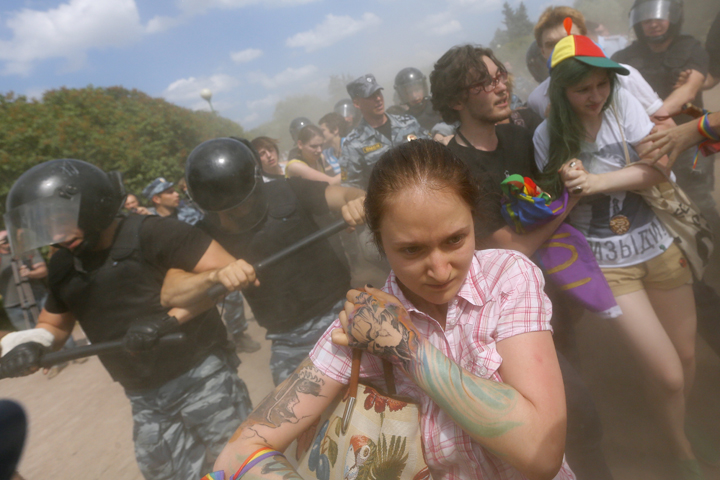OTTAWA – Gay Canadians heading to the 2014 Winter Games in Russia – or anyone demonstrating support for equal rights while there – could be fined, detained or deported.

Russian President Vladimir Putin recently signed into law a series of anti-gay measures fewer than seven months before his country takes the world stage as host of the 2014 Olympics.
The most recent piece of legislation, which Putin signed earlier this month, forbids gay couples and single or unmarried citizens of countries that recognize same-sex marriage from adopting a Russian-born child.
Days before he signed that, Putin approved a law bestowing powers on Russian police to fine, detain for up to 14 days and expel tourists and foreign nationals suspected of being gay or disseminating pro-gay “propaganda.”
But in February, Russia will open its arms to many countries who actively advance equal rights, including some top medal winners – Canada, The United States, Norway and Austria, to name a few.
READ MORE: Dozens arrested at gay pride rally in Russia
Canada is known to support equal rights not only in the home, but in sports as well: One of the country’s most prominent gay Olympians became the team’s Chef de Mission for the London Games in 2012.
Mark Tewksbury came out in 1998 after winning gold, silver and bronze medals for swimming in the 1988 and 1992 Summer Games. He went on to become an active advocate for gay rights in Canada and around the world.
More recently, a long list of NHL players – including many Canadians and potential 2014 Olympians such as Carey Price, Claude Giroux, and Jordan Eberle — participated in You Can Play, an advocacy group promoting the rights of gay athletes in sport.
Should any of those athletes decide to voice their already stated support for gay rights while at the Games, they could risk prosecution under Russia’s new law.
In the days after the law was passed, the International Olympic Committee published a release affirming its support for all athletes regardless of race, sex or sexual orientation, and guaranteed the games will go on without discrimination. The committee said Russian authorities have assured the new legislation will not affect those “attending or taking part” in the Games, even in the light of increasing violence against homosexuals in Russia.
The Canadian government has also taken notice.
“The latest development in Russia is extremely troubling and Canada has raised its concerns directly with Russian authorities,” Rick Roth, a spokesman for Foreign Affairs Minister John Baird, wrote in an emailed response to Global News. “The promotion of Canadian values has and will continue to feature prominently in our ongoing dialogue.”
The federal travel advisory for Russia, to which Roth pointed, includes a note that homosexual and pro-homosexual statements could be “punishable.” But the government isn’t taking any direct actions against the country ahead of the Olympics.
The RCMP will be overseeing the safety of Canada’s athletes while in Sochi. During security briefings, officers plan to flag safety issues and review Russia’s laws with the Olympians, their trainers and coaches.
“The Sochi security briefing will include a briefing on the recently signed law giving authorities the rights to detail tourists and foreign nationals suspected of being homosexual or gay,” RCMP spokesman Cpl. David Falls wrote in an email.


Comments